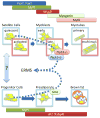The not-so-skinny on muscle cancer
- PMID: 23079652
- PMCID: PMC3486430
- DOI: 10.1016/j.ccr.2012.09.018
The not-so-skinny on muscle cancer
Abstract
The childhood cancer embryonal rhabdomyosarcoma can arise in tissue without skeletal muscle elements. In this issue of Cancer Cell, Hatley and colleagues report that non-skeletal muscle progenitors can be a cell of origin for Sonic Hedgehog-driven embryonal rhabdomyosarcoma in an adipocyte-restricted conditional mouse model.
Copyright © 2012 Elsevier Inc. All rights reserved.
Figures

Comment on
-
A mouse model of rhabdomyosarcoma originating from the adipocyte lineage.Cancer Cell. 2012 Oct 16;22(4):536-46. doi: 10.1016/j.ccr.2012.09.004. Cancer Cell. 2012. PMID: 23079662 Free PMC article.
References
-
- Asakura A, Komaki M, Rudnicki M. Muscle satellite cells are multipotential stem cells that exhibit myogenic, osteogenic, and adipogenic differentiation. Differentiation. 2001;68:245–253. - PubMed
-
- Brack AS, Conboy MJ, Roy S, Lee M, Kuo CJ, Keller C, Rando TA. Increased Wnt signaling during aging alters muscle stem cell fate and increases fibrosis. Science. 2007;317:807–810. - PubMed
-
- Gurney JG, Young JL, Jr, Roffers SD, Smith MA, Bunin GR. Soft Tissue Sarcomas. In: Ries LAG, SM, Gurney JG, Linet M, Tamra T, Young JL, Bunin GR, editors. Cancer Incidence and Survival among Children and Adolescents: United States SEER Program 1975–1995, National Cancer Institute, SEER Program. Bethesda, MD: National Cancer Institute; 1999. NIH Pub. No. 99–4649.
Publication types
Grants and funding
LinkOut - more resources
Full Text Sources
Molecular Biology Databases

